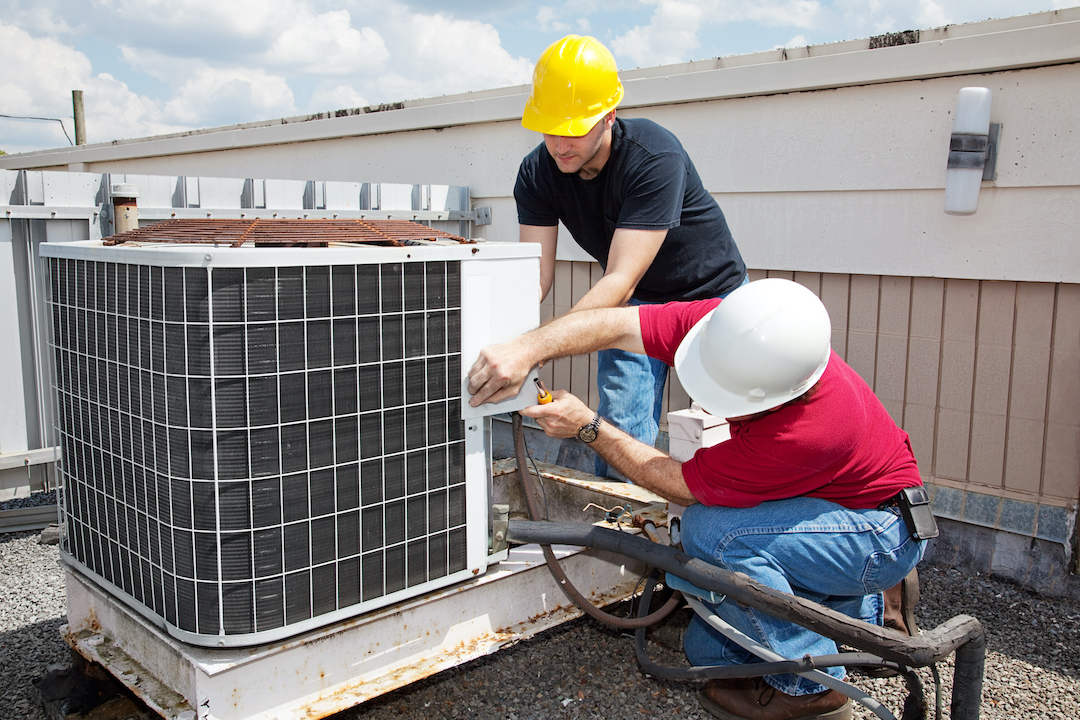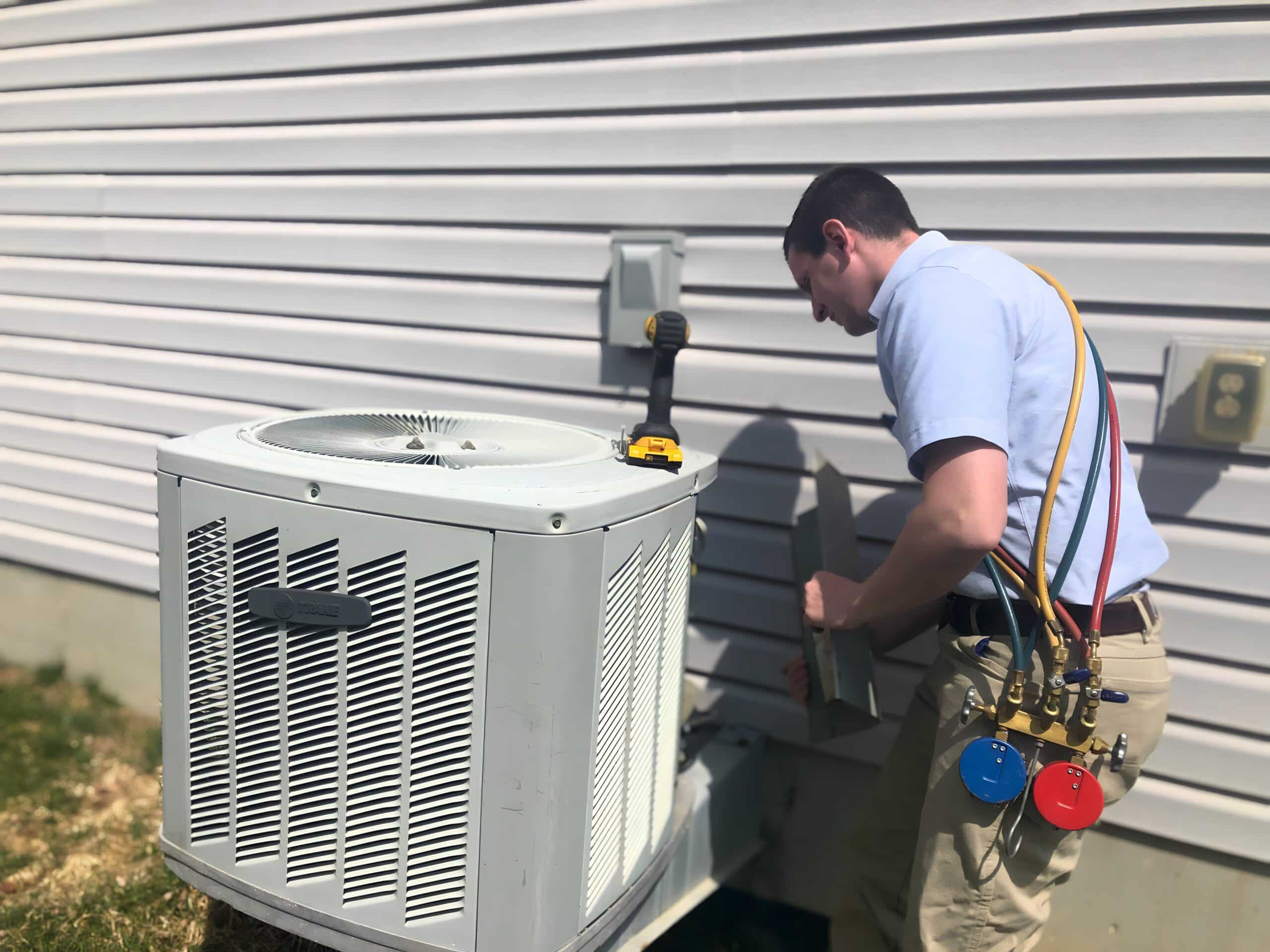Things to Know Before Your heat pump replacement ooltewah tn Starts
Things to Know Before Your heat pump replacement ooltewah tn Starts
Blog Article
Choosing Between a Heat Pump and Heating System: Key Considerations for Your Heating And Cooling Demands
When examining home heating options for cooling and heating requires, the choice between a heatpump and a heater can be complex. Each system offers unique benefits tailored to particular climates and energy effectiveness objectives. Comprehending these differences is crucial for making an informed selection. Trick elements such as installment expenses and environmental effect even more complicate the selection process. Which option truly straightens with one's comfort and sustainability choices? The following sections will certainly check out these factors to consider in information.
Recognizing Warm Pumps: Exactly How They Function and Their Advantages
While numerous property owners think about numerous home heating options, recognizing how heatpump function and their benefits can considerably influence their decision. Warmth pumps run by transferring warm instead of creating it. In the winter months, they remove heat from the outdoors air or ground and move it inside your home, while in the summertime, they reverse this procedure, cooling the home by removing warmth outside. This twin capability makes them functional for year-round environment control.One of the primary benefits of heatpump is their power effectiveness. They use considerably less electrical energy compared to conventional heater, potentially causing reduced utility expenses (ductless mini splits). Additionally, warm pumps have a smaller carbon footprint, making them an environmentally friendly selection. They also call for less upkeep than standard systems, contributing to lasting price savings. On the whole, understanding the technicians and advantages of heat pumps can assist homeowners make informed choices regarding their heating and cooling demands
Exploring Heaters: Kinds, Procedure, and Benefits
Heating systems come in various types, including gas, electrical, and oil models, each with distinct functional devices. Understanding these differences is necessary, as they impact efficiency and heating performance. Furthermore, furnaces provide numerous advantages, such as consistent warm result and reliability in chillier climates.
Sorts of Heaters
Heating unit can vary substantially in layout and operation, with heating systems being a popular option among house owners. There are numerous types of furnaces, each utilizing various gas sources and modern technologies. Gas heating systems are usual, leveraging all-natural gas to generate warmth effectively. Electric furnaces, on the various other hand, make use of electric resistance to create heat, usually preferred for their straightforward setup. Oil heating systems, while less common, are efficient in locations with minimal gas accessibility (ductless mini splits). In addition, condensing heating systems maximize power efficiency by capturing and recycling exhaust gases. Each kind runs via a system of heat exchangers and ductwork to disperse warm air throughout a home. Comprehending the distinctions between these heater types is vital for notified heating and cooling decisions
Advantages of Furnaces
For house owners looking for trusted heat during cool months, the advantages of furnaces are substantial. Heating systems give regular home heating, making sure also temperatures throughout the home. They are especially reliable in extreme chilly, frequently outshining warmth pumps in freezing conditions. Different types, consisting of gas, electric, and oil heating systems, offer versatility to meet varied demands and preferences.Furnaces additionally often tend to have lower initial installment expenses compared to heatpump, making them an extra accessible choice for many. Their robust design adds to a longer lifespan, with lots of devices lasting over 15 years with appropriate maintenance. In addition, modern-day heaters are usually geared up with innovative technology for enhanced performance, which can lead to reduced energy costs. In general, heating systems remain a trustworthy selection for efficient home heating.

Power Efficiency: Comparing Warm Pumps and Furnaces
When comparing energy performance between heatpump and furnaces, the Seasonal Power Effectiveness Ratio (SEER) plays a necessary duty in determining efficiency. Furthermore, an operational price evaluation discloses the lasting economic effects of each system. Understanding these factors can direct homeowners in making educated choices about their home heating remedies.
Seasonal Power Performance Proportion
Power performance plays a crucial role in the decision-making procedure between warmth pumps and heaters, specifically when taking into consideration the Seasonal Power Efficiency Proportion (SEER) This metric measures the cooling performance of heatpump over an entire cooling period, supplying a standard means to assess performance. Higher SEER rankings show greater energy performance, converting to lower power intake and lowered energy expenses. In comparison, heaters are commonly evaluated making use of the Annual Fuel Application Performance (AFUE) score, which shows heating performance. When comparing these two systems, house owners must focus on SEER ratings for heatpump, as they directly influence total energy financial savings and environmental sustainability. A complete understanding of SEER can especially Homepage affect the long-term satisfaction and cost-effectiveness of the picked HVAC service.
Functional Cost Analysis
Recognizing the functional expenses connected with warm pumps and heating systems is vital for house owners reviewing their alternatives. Warmth pumps commonly offer higher energy performance, transforming electric energy into warmth with very little waste. This causes reduced month-to-month utility expenses, particularly in moderate climates. Conversely, conventional furnaces, especially gas designs, might have reduced ahead of time prices but can incur higher operational expenditures gradually due to fuel costs and effectiveness ratings.Moreover, heatpump can function as both home heating and cooling down systems, potentially lowering the demand for separate a/c devices. While preliminary financial investments for heatpump may be higher, their long-term financial savings in energy performance can make them an extra affordable choice for lots of families. Careful analysis of regional energy prices is important to figure out the finest choice.
Installment Costs: What to Expect for each and every Heating System
Setup expenses for heater can differ substantially in between heatpump and heating systems, influencing house owners' choices. read more Warmth pumps usually have greater upfront installation costs, generally ranging from $3,500 to $8,000, relying on the device dimension and complexity of installment. This consists of the outside unit, interior handling system, and needed ductwork adjustments. Alternatively, heaters have a tendency to have lower initial expenses, balancing between $2,500 and $6,000, which can be appealing for budget-conscious homeowners. Installment costs can raise if substantial ductwork is required.Moreover, the choice of gas type for furnaces-- all-natural gas, lp, or electric-- can additionally influence installation expenses. While heatpump provide energy efficiency, their initial financial investment might discourage some purchasers. Eventually, assessing installation costs alongside long-term savings and efficiency will certainly aid house owners in making notified decisions about their furnace.
Climate Factors To Consider: Which System Executes Much Better in Your Area
How do environment problems influence the efficiency of heater? The efficiency of heat pumps and heating systems can differ greatly depending upon the local environment. In moderate climates, warmth pumps succeed by effectively transferring warm from the outdoors air, making them an energy-saving choice. Their effectiveness reduces in very chilly temperature levels, where they may have a hard time to extract enough warmth. Alternatively, furnaces, particularly gas versions, give trusted and regular warm no matter of outside problems, making them preferable in chillier regions.In areas that experience milder wintertimes, heatpump can run effectively year-round, supplying both cooling and heating. In contrast, areas with harsh wintertimes frequently profit from the robustness of furnaces. Ultimately, understanding the regional climate is crucial when deciding between a warmth pump and a furnace, as it directly impacts their operational performance and total efficiency.
Maintenance Requirements: Long-Term Care for Heat Pumps vs. Furnaces
While both warmth pumps and heating systems need routine check it out maintenance to ensure peak performance, their details demands and treatment regimens differ substantially. Furnaces usually require much less regular interest, with annual assessments sufficing to look for gas leaks, clean filters, and analyze total functionality. Their less complex design commonly enables straightforward repairs.In comparison, heatpump require biannual upkeep because of their dual role in cooling and heating. This includes cleaning coils, examining cooling agent degrees, and making sure that both the outdoor and interior systems operate at their best. Furthermore, heatpump maintenance commonly involves even more intricate elements, making professional maintenance essential.Neglecting maintenance can bring about decreased performance and enhanced energy costs for both systems. Inevitably, homeowners should consider these long-lasting care demands when selecting in between a warmth pump and a heating system, as proactive upkeep can prolong the lifespan and performance of either system considerably.
Ecological Effect: Choosing a Lasting Heating Choice
The ecological effect of heater is an essential examination for homeowners looking for lasting alternatives. Heatpump are generally extra energy-efficient than conventional heating systems, as they move warmth instead than create it, considerably reducing carbon discharges. By using eco-friendly power resources, such as air-source or geothermal heatpump, homeowners can even more reduce their ecological footprint.On the other hand, gas furnaces send out greenhouse gases and add to air contamination, though they often give higher warm outcome. Nonetheless, improvements in innovation have actually led to the advancement of high-efficiency furnaces that decrease emissions.Ultimately, picking a heating system includes considering efficiency against ecological impact. Home owners are urged to reflect on neighborhood energy resources and incentives for sustainable systems, making sure a choice that aligns with both personal convenience and ecological duty. The choice affects not only prompt convenience however additionally long-term sustainability and environmental health.
Frequently Asked Inquiries
How Long Do Warm Pumps and Furnaces Commonly Last?
The life expectancy of heatpump typically varies from 15 to two decades, while furnaces can last in between 15 to thirty years. Regular upkeep substantially impacts their longevity and effectiveness in supplying heating remedies.
Can I Use a Warm Pump in Very Cold Climates?
Heatpump can operate in exceptionally cool climates, yet their efficiency decreases as temperatures decrease. In such problems, additional home heating resources may be essential to maintain comfortable indoor temperatures and ensure peak efficiency.

What Is the Noise Degree of Warm Pumps Versus Furnaces?
The noise degrees of heatpump and furnaces differ substantially. Generally, warm pumps operate even more silently than standard heating systems, making them more suitable for those conscious sound, while furnaces might create louder functional sounds during heating cycles.
Are Warm Pumps Suitable for Both Heating and Air conditioning?
Heatpump are certainly suitable for both cooling and heating (ductless mini splits). They operate by transferring warm, supplying effective temperature level control year-round, making them a versatile selection for home owners seeking an all-in-one heating and cooling remedy
What Dimension Heater Do I Required for My Home?
Establishing the suitable dimension heater for a home calls for reviewing factors such as square footage, insulation top quality, regional environment, and the home's design. Consulting a specialist can assure an exact evaluation and perfect comfort. Heat pumps typically use higher energy efficiency, converting electric power right into warm with very little waste. In modest climates, warmth pumps stand out by efficiently moving heat from the outdoors air, making them an energy-saving option. Conversely, furnaces, particularly gas models, give reliable and regular heat no matter of outdoor conditions, making them more suitable in chillier regions.In locations that experience milder winters months, warm pumps can operate efficiently year-round, supplying both home heating and cooling. Warm pumps are generally a lot more energy-efficient than standard furnaces, as they move heat instead than generate it, greatly minimizing carbon emissions. By utilizing eco-friendly power resources, such as air-source or geothermal heat pumps, home owners can additionally minimize their ecological footprint.On the various other hand, natural gas heating systems discharge greenhouse gases and add to air contamination, though they typically provide greater warm output.
Report this page